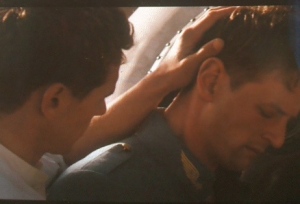 I’d noticed the shorts. Of course I’d noticed the shorts. We were all in a big meeting, and there they were, failing to cover my colleague’s pale white legs, making his sandals even more obvious. Every other man around him wore trousers. They kept their legs to themselves. Even though it was one of the hottest days of the year, and we were all sweltering. I was doubly surprised: firstly, a colleague was wearing seconds, and secondly, it was Ted, who had always seemed to me to be quite traditional.
I’d noticed the shorts. Of course I’d noticed the shorts. We were all in a big meeting, and there they were, failing to cover my colleague’s pale white legs, making his sandals even more obvious. Every other man around him wore trousers. They kept their legs to themselves. Even though it was one of the hottest days of the year, and we were all sweltering. I was doubly surprised: firstly, a colleague was wearing seconds, and secondly, it was Ted, who had always seemed to me to be quite traditional.
“Did you see Ted’s summer attire?” our colleague David scoffed, when he and I were alone in the lift. I knew that he wasn’t really gunning for Ted; it was just light mockery. It’s a form of friendly fire that people dismiss as “banter”.
“Oh, erm…? Oh, the shorts and sandals,” I said, playing dumb initially, to indicate that I hadn’t really thought about Ted’s clothing.
Then I paused. I thought for a split second, and then decided to plunge in and say something. “It’s so hot,” I said. “You’ve gotta do something.”
If I’d had more time to think about my reply, or to write it and redraft it, I’d have said something better. Something like: “On a day like today, Ted’s the smartest man in the room.” Or: “He’s an example to us all: sensible, practical, and unconcerned about gossip in the lift.” Or even: “Yeah, what’s your problem, David?”
In any case, David seemed to be quieted by my response. He must have detected that I didn’t want to engage in the banter. You might say that I won, but I don’t feel like I did. I was still wearing trousers, and I knew then that I would still wear them the next day too.
When I started working with the colleagues I have now, I noticed that the men were fairly uniform in what they wear. They were not as uniform as everyone wearing a grey or navy suit—effectively an actual uniform. But most of them wear a casual shirt and comfortable trousers, such as jeans or chinos. The colours and patterns are subtle. There are no Hawaiian carnivals or African prints.
I was very conscious of this when I started, and although I hate the idea of having to fit in, I made decisions that I wouldn’t have made in my old job. I decided against wearing certain T-shirts or, if I did wear them, I’d made sure it was on a day when I’d keep my plain jumper on over the top. More recently, nearly a year into my job I’m feeling more comfortable at work, and I believe people are aware of what I’m able to do—so I’ve been relaxing my own dress code. What does that mean? It means I’ll now wear a T-shirt without a jumper or shirt over the top. It means I’ll leave my shoes under my desk and walk around in socks.
Of course, the kind of lift-located mockery Ted is enduring is nothing compared to the harassment that women have endured for centuries. And the annoyance I feel when I scan my wardrobe and decide what to wear, and what it means, is tiny compared to what women have to go through. But still, it’s real.
I’m still not as brave as Ted. I wear shorts all the time in the summer outside of work. But the combination of shorts and the trainers or sandals I’d wear them with might be all too much for people like David. I can’t be arsed with that kind of crap.
Ted’s my hero. Maybe one day I’ll be like him.





